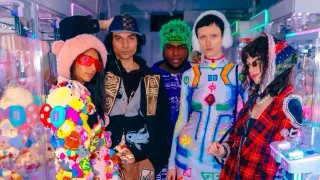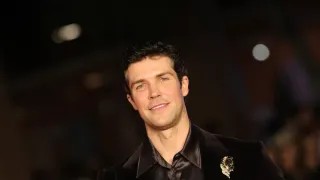
6 hours ago
Chosen Family, Chosen Self: Tommy Dorfman’s “I Wish You All the Best” Redefines Queer Coming-of-Age on Screen
READ TIME: 3 MIN.
There’s a specific kind of electricity that crackles through the air when a film finally tells a story the queer community has been waiting for. With “I Wish You All the Best,” director Tommy Dorfman delivers that rare, immediate jolt: a coming-of-age drama that centers not just a queer teen, but a nonbinary protagonist—Ben DeBacker—whose journey is as much about survival as it is about joy and love .
Adapted from Mason Deaver’s acclaimed novel, the film opens with a gut punch all too familiar to many: after coming out as nonbinary, Ben (Corey Fogelmanis) is kicked out by their parents. With nowhere else to turn, Ben finds an unexpected lifeline in their estranged older sister, Hannah (Alexandra Daddario), and her husband, Thomas (Cole Sprouse) .
But “I Wish You All the Best” is not just about trauma—it’s about what happens after. It’s about the awkward, liberating, sometimes hilarious process of rebuilding your life, your identity, and your chosen family when the one you were born into lets you down. And for queer viewers, the film’s message is both a balm and a battle cry: you deserve to be seen, celebrated, and loved, exactly as you are.
Dorfman, herself a prominent transgender artist, infuses the film with a lived-in understanding of what it means to be nonbinary in a binary world . The camera lingers on the quiet moments—Ben’s tentative first steps into a new school, the gentle support of an art teacher (Lena Dunham), and the budding friendship-turned-romance with Nathan (Miles Gutierrez-Riley), a classmate whose warmth is a beacon in Ben’s storm .
What sets “I Wish You All the Best” apart is its refusal to reduce Ben’s story to suffering. Instead, the film insists on the full spectrum of queer experience: the giddy awkwardness of first crushes, the healing found in creative expression, and the radical act of claiming your own narrative. In a cinematic landscape still catching up to the realities of transgender and nonbinary youth, Dorfman’s vision is a revelation.
The romance between Ben and Nathan is refreshingly free of tragic overtones. Their chemistry is built on mutual respect, inside jokes, and the kind of bashful vulnerability that feels as real as it does rare. This isn’t a love story about fixing someone; it’s about two people learning to see—and be seen—without apology. For many queer viewers, this onscreen tenderness feels revolutionary in its ordinariness.
The impact of “I Wish You All the Best” reverberates far beyond the movie theater. For nonbinary and transgender audiences, seeing Ben’s journey on a major studio release is an affirmation that their stories matter—not as side plots, but as the heart of the narrative . Early reviews are overwhelmingly positive, with critics praising the film’s emotional honesty and the standout performances of its young cast .
Corey Fogelmanis’s portrayal of Ben brings nuance, humor, and a gentle strength to a character rarely afforded such complexity on screen . In interviews, Dorfman has spoken about the importance of casting authentically and creating a safe environment for queer narratives to flourish—a commitment that shines through in every frame .
From the subtle costuming choices to Brad Oberhofer’s emotive score, the film’s creative team has clearly prioritized authenticity. For those who have ever felt erased or misunderstood, “I Wish You All the Best” is a cinematic embrace—a reminder that visibility is not just about being seen, but about being truly understood.
In a year marked by ongoing debates around transgender rights and a wave of anti-LGBTQ+ legislation, “I Wish You All the Best” arrives as both art and activism. Its release is a testament to the resilience of queer storytellers and the hunger for narratives that reflect the richness of LGBTQ+ lives .
The film’s world premiere at SXSW was met with palpable excitement, signaling a shift in how mainstream audiences engage with queer stories . For younger viewers, Ben’s journey is a mirror; for older generations, it’s a chance to witness how far representation has come—and how much further it can go.
And for everyone who’s ever had to invent themselves from the ground up, “I Wish You All the Best” is a love letter to the power of chosen family, the necessity of queer joy, and the enduring truth that the best stories are those that dare to be honest.
As the credits roll, one thing is clear: this isn’t just Ben’s story—it’s ours.






